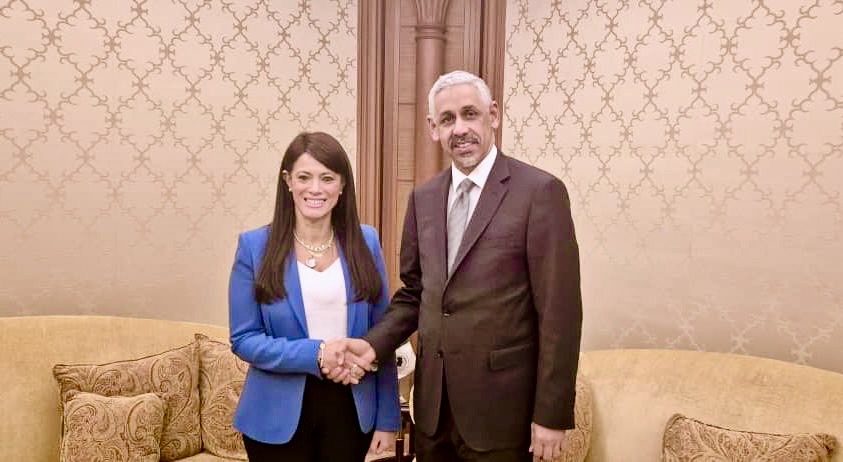Discussing preparations for the first visit of the African Development Bank President to Egypt, as one of his initial stops to member states after assuming his position as President of the Bank Group.
The Bank’s continued support for the implementation of the National Structural Reforms Program and the completion of the economic, social, and sectoral reform agenda, contributing to the achievement of sustainable development.
Joint coordination to exchange expertise, share Egyptian experiences, and leverage them to support the resilience of African continent countries._
Mobilizing the innovative financing needed to stimulate private sector investments in the African continent and providing financing guarantees to improve access to financial markets and reduce investment risks.
H.E. Dr. Rania Al-Mashat, Minister of Planning, Economic Development and International Cooperation, met with H.E. Dr. Sidi Ould Tah, President of the African Development Bank (AfDB), during her participation in the ninth edition of the "Future Investment Initiative" (FII9) Conference in the Kingdom of Saudi Arabia.
The meeting discussed a number of important strategic issues in the context of preparing for the AfDB President's anticipated visit to the Arab Republic of Egypt, which is one of his first external visits to member states following his assumption of the presidency of the African Development Bank. This underscores the depth of the strategic partnership between the two sides and embodies Egypt's leading role within the African continent.
Dr. Rania Al-Mashat stated that the cooperation between Egypt and the Bank reflects the confidence of International Financial Institutions (IFIs) in the economic reform path adopted by the State.
In turn, the AfDB President emphasized the Bank's continued support for the implementation of the National Structural Reforms Program and the completion of the economic, social, and sectoral reform process, contributing to the achievement of sustainable development. The African Development Bank is considered one of the most important development partners that has contributed to financing budget support programs and providing concessional financing to implement structural reform policies and achieve the resilience of the Egyptian economy over the past years, which aimed to encourage private sector investments by improving the business environment and investment climate, enhancing the framework of competition and commercial justice, supporting economic diversification and the green transition through strengthening key productive sectors, and enhancing food security and mitigating risks for the most vulnerable.
Minister Al-Mashat stressed the significant importance of developing innovative financing mechanisms to provide the necessary funding to support the private sector, the necessity of reducing the cost of financing for member states and the private sector, and enhancing engagement in the development process, with a focus on mobilizing resources to implement priority national projects in various development sectors through public-private partnerships.
Dr. Al-Mashat added that Egypt presents a realistic model for multilateral cooperation, based on maximizing local resources, advancing public-private partnership mechanisms, and translating reforms into tangible results in employment, production, and investment.
The two sides also emphasized the importance of continuing cooperation in climate action and maintaining coordination in formulating and implementing initiatives and programs aimed at strengthening resilience in the face of climate change. They also stressed seeking to share Egyptian expertise and experiences and leveraging them to support the resilience of African continent countries. The African Development Bank seeks to be guided by the successes achieved by Egypt within the framework of the National Green Projects Platform, "the NWFE program," and transfer them to other African countries.
The African Development Bank is a key and strategic partner supporting Egypt's country platform for the "NWFE" program, serving as the leading development partner for the water axis projects within the "NWFE" program. The Bank provided financial and technical support to contribute to financing the preparation of the "Water Desalination using Renewable Energy" project and offered a number of financings to the private sector to implement energy pillar projects, including the Kom Ombo 200 MW Solar Power Plant project, the Gulf of Suez 1100 MW Wind Energy project, and the Obelisk 1000 MW Solar Power + Storage Batteries project, in addition to technical support to the New and Renewable Energy Authority for preparing the necessary environmental studies.
Both sides reaffirmed the importance of continued joint cooperation in proposing and formulating a comprehensive vision for reforming the global financial architecture, to achieve a more equitable economic system that serves the interests of the African continent, contributes to addressing economic and financial challenges, mobilizes climate finance, encourages private sector investments, and promotes a just and green transition on the continent.
For his part, Dr. Sidi Ould Tah praised Egypt's successful experiences in bond issuance programs and their associated financing guarantees, which contributed to improving access to finance and reducing investment risks, viewing it as a model for the region that can be built upon and expanded through cooperation with the Bank to support similar programs in other African countries. It is worth noting that a joint credit guarantee (valued at $345 million) was previously arranged by the African Development Bank in partnership with the Asian Infrastructure Investment Bank ($200 million) to support the Arab Republic of Egypt's issuance of Panda Bonds in Chinese markets in October 2023. This was the first guarantee of its kind provided by the Bank to any of its member states.
The meeting also touched on the long-standing partnership between Egypt and the African Bank since 1974, during which the Bank's development cooperation portfolio with Egypt has seen increasing growth, reaching a total value of approximately $7.79 billion, of which more than $1.1 billion financed about 16 private sector operations.
